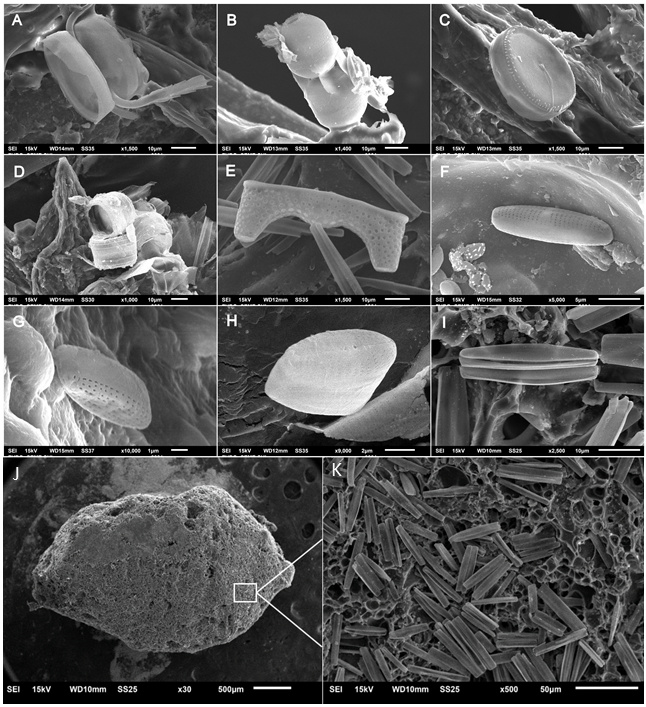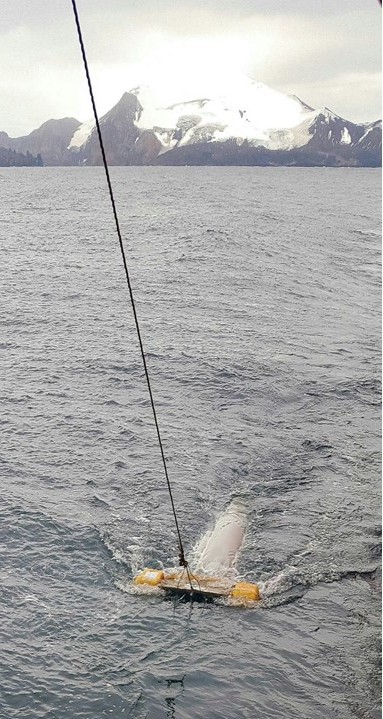- Details
- Hits: 109
A recently stdudy published in Nature's Scientifc Reports, authored by Ana Luzia de F. Lacerda, a FURG's PhD student in Biological Oceanography, e quantify and characterize plastic debris in oceanic surface waters of the Antarctic Peninsula. Mean debris concentration was estimated at 1,794 items.km-2 with an average weight of 27.8 g.km- , with items of different formats (fragments, lines and spheres), sizes (meso and microplastics) and chemical composition ( nylon, polyurethane and polyethylene). An oceanographic dispersal model showed that, for at least seven years, sampled plastics likely did not originate from latitudes lower than 58°S, which means that the plastics collected in this study were predominantly from local sources (animation available at: Figshare_dispersal_model__plastics_in_Antarctic_ / 7000580). However, the authors do not rule out the possibility of transporting these polymers from other regions by means of marine currents.
In addition to the characterization of plastics, the organisms that form the biofilm on the surface of these materials, now known as "Plastisphere", have also been identified, since plastics act as an artificial substrate for the development of adhered communities and them. In the Antarctic Plastisphere, for example, different species of microalgae, bacterial colonies and invertebrates were identified. The authors also highlighted the contamination of paint fragments in the region, possibly coming from vessels and nautical apparatus, which may have similar impacts to those of plastics in the oceans.
|
Foto 1: Diatomáceas encontradas na Plastifera |
Foto 2: Rede manta operando para coleta de plásticos em águas marinhas superficiais no entorno de Península Antártica. Fonte: Projeto Lixo Marinho-FURG. |
E-mail: analuzialacerda@gmail.com
- Details
- Hits: 284
FURG was one of the 36 teaching and research institutions throughout the country included in the Capes-PrInt Notice. The university proposition involved six graduate programs: Biological Oceanography; Physical, Chemical and Geological Oceanography; Aquaculture; Engineering and Food Science; Health Sciences; and Nursing. With this, FURG makes an appearance among the universities with the greatest potential for internationalization, according to the Dean of Research and Graduate Studies, Eduardo Secchi. "The insertion of FURG in the PrInt Program defines a new moment for research and, especially, for the University's Graduate Program, and also consolidates strategies that were defined in the Policy and in the recently approved Internationalization Institutional Plan," highlights the dean.
The theme of the Internationalization Institutional Project (PII) "Sustainability in Coastal and Oceanic Ecosystems: Cluster of Excellence in the Extreme South of Brazil" is aligned with contemporary issues of global relevance, evidenced in intergovernmental policies. The United Nations declares the oceans the target of Goal 14 "Life under water" (Sustainable Development Goal - SDG 14) in the Sustainable Development Agenda 2030. This importance of the oceans for climate balance and for life safety on the Earth also made the United Nations declare 2020-2030 as the Decade of Oceanographic Studies. Thus, taking into consideration: i. the dimensions of the Brazilian Exclusive Economic Zone, with a 3.7 million km2 ca. surface, and all its potential to meet national demands on strategic issues for the country, such as food and environmental security, climate forecasting, bio and geoprospection, alternative energy, biodiversity, among others; ii. the verified excellence of FURG in sea-related matters; and iii. the alignment of the four thematic axes of the PII-FURG (Bio/Geodiversity and Bio/Marine Geoprospection, Safety and Food Quality of Marine Resources, Climate Change and Impacts on Marine and Coastal Ecosystems, as well as Human Health in Coastal Ecosystems) with the global initiatives and the institutional vocation of FURG - a university focused on the coastal and oceanic ecosystems - Capes approved the PII-FURG, thus allowing the university to strengthen its Latin American leadership in marine affairs.
The PII-FURG was developed by the Propesp team, together with Reinter and a Proposal Management Committee, composed of IO, EQA, Famed and EEnf professors, and a researcher from the University of Kiel (Germany), in articulation with the coordinators of the six aforementioned graduate programs.



